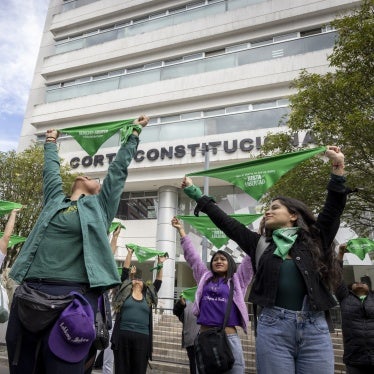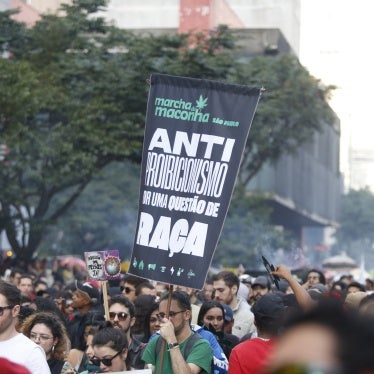In a report released today, Human Rights Watch urged the Venezuelan government to take immediate steps to improve prison conditions and reduce prison violence during the final six months of its mandate.
The report, issued in Spanish, describes a series of grave human rights abuses in the country's dangerous, overcrowded and physically deteriorating penal facilities.
At the same time, the U.S.-based human rights group released in English and Spanish a letter to President Rafael Caldera calling for independent investigation of extrajudicial executions by Venezuelan police forces in recent years.
An independent commission should also make recommendations to end such brutal practices by the police, the group said. The letter detailed eight cases that illustrate the range of extrajudicial executions carried out by police between 1993 and 1997, almost all of them ending in impunity for the perpetrators.
Human Rights Watch noted encouraging promises from the authorities on prison reform in the last few years, but little concrete improvement in the prisons. "In fact, last year was one of the most violent years on record, with hundreds of inmates killed and well over a thousand injured," said José Miguel Vivanco, executive director of Human Rights Watch's Americas division. "Even pretrial detainees _ presumed innocent of any crime _ have faced these arbitrary and unadjudicated death sentences. Because of such abuses, the prison issue remains a blight on President Caldera's record in office."
According to the 114-page report _ an updated translation of Human Rights Watch's 1997 report, Punishment Before Trial _ a steady traffic in arms facilitates the violence, with weapons of all types flowing into the prisons. In January 1998 alone, prison searches uncovered 2,258 knives, nine pistols, twelve revolvers, 463 artisanal firearms, a rifle, and _ most alarmingly _ four grenades. During that same month, thirty-six inmates were killed.
In June 1997, Minister of Justice Hilarión Cardozo reportedly declared his goal of transforming the prison system, so that in a year he would be able to invite the international community to Venezuela to witness the dramatic changes. Although the necessary reforms have evidently not been implemented as promised, Human Rights Watch believes that the time remaining in the government's term is sufficient to institute significant improvements.
As the report's title suggests, the majority of Venezuelan prisoners are unsentenced _ many of them wait years in prison as their cases winds their way through the inefficient and overwhelmed criminal justice system. One encouraging development discussed in the report is, however, the reform of the code of criminal procedure. The new Código Orgánico Procesal Penal, approved on January 20, 1998, was designed in part to speed up the pace of criminal proceedings and facilitate pretrial release. Another hopeful reform was the establishment of the Office of Supervision and Control of the Penitentiary System (Oficina de Fiscalización y Control del Sistema Penitenciario) in August 1997, which is charged with monitoring human rights abuses in the prisons.
On the negative side of the balance sheet is the lack of progress in the judicial investigations of numerous prison massacres, which remain stalled in the early stages of prosecution. Moreover, despite the opening of new prisons, the problem of severe prison overcrowding remains at the root of many of the penal system's abuses. The report includes detailed recommendations for reform of the country's prisons.
Human Rights Watch's letter to the president about police killings also welcomes the new Código Orgánico Procesal, which should remove some of the obstacles currently in place to the effective investigation, prosecution, and punishment of those who violate human rights.
Nonetheless, the new procedural code will not apply to cases in which investigations were opened before its enactment, which will continue to be prosecuted under the old rules. Because Human Rights Watch and Venezuelan human rights monitors have found a pattern of impunity in these cases, the international organization called for establishment of an independent commission, as recommended in such situations by the United Nations Principles on the Effective Prevention and Investigation of Extra-Legal, Arbitrary and Summary Executions.
In addition to naming members to the commission known for their competence and impartiality, Vivanco urged the government to give the commission its full cooperation and to implement faithfully its recommendations as "a sign of political will to end impunity for human rights violations."
Among the eight cases presented by Human Rights Watch was that of José Gregorio Rondón, shot dead in his home in Caracas on July 4, 1997, by members of the Technical Judicial Police, who apparently mistook him for a criminal known as "El Chino." Police tried to cover up their mistake by planting drugs and weapons in Rondón's bedroom, claiming he had violently resisted arrest, and threatening his sister if she did not sign statements incriminating her brother.
Also detailed was the case of eight-year-old Yesser Smith Guzmán Luzón, shot dead by Metropolitan Police on May 24, 1997, as he flew a kite in front of his home in Caracas. Even though the police's initial story that the child died in a shoot-out was dismissed by the Metropolitan Police director, the prosecution remains stalled since the three officers suspected have ignored repeated summons to testify.
"Unfortunately, these tragic stories are all too frequent in Caracas's slums," Vivanco noted. "It is imperative that these cases be prosecuted and that reforms be launched so law enforcement can become both effective and respectful of rights."








